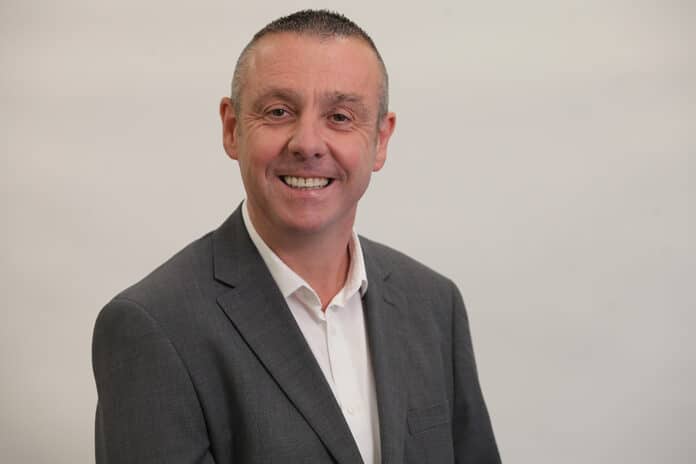Network Rail principal contractor Amaro has enjoyed year-on-year growth since its current managing director, Micky Ewart, took to the helm in 2019. Speaking exclusively to RBD, Micky discusses his journey from signal and telecoms apprentice to MD of a multimillion-pound company – and explains why Amaro’s people are its greatest asset
Micky, you began your rail career as an apprentice. Could you tell us more about this?
I joined the industry in 1991 as a signal and telecoms apprentice. At that time, ‘trainee technicians’ studied electronic engineering at college, before working in signalling and telecoms for two years.
When the time came to choose an area of specialism, most of my peers opted for telecoms, as mobile phone technology was becoming more prevalent. I missed out on my initial choice and found myself in signalling – which, looking back, was the best thing that could have happened. I was afforded learning and development opportunities I would have been unable to access in another industry.
How did your career develop after this initial apprenticeship?
I spent around seven years in signal, fault and maintenance teams, gradually moving through the ranks. I began as a trainee technician, and was promoted to senior technician, then team leader, then supervisor.
During that time, the industry was undergoing privatisation. I eventually worked for Balfour Beatty Rail Maintenance as a signal supervisor, before transitioning to Jarvis, where I was a signalling and telecoms maintenance engineer.
In around 2008, I returned to university to study part-time for a master’s degree in Power, Distribution and Engineering. This enabled me to become an IME (infrastructure maintenance engineer), and I looked after everything from signalling and telecoms to tracks, overhead lines and civils.
After a stint as an IME in Hitchin, I was awarded the role of route programme director for works delivery on the East Coast Main Line.
What was your route into the contracting world, and how did you become managing director of Amaro?
In 2014, two colleagues and I were asked to transform the fortunes of specialist contractor Giffen, which had been bought by a private equity firm. We turned the business around and, five years later, I was tasked with doing the same at Amaro.
When I joined the company as operations director, it had just eight members of staff. Today, we employ over 60 people, and have recorded year-on-year increases in our annual turnover. In 2022 alone, we supported seven frameworks and completed over 40 projects. It’s been a dramatic turnaround, and the business is flying.
What factors have contributed to Amaro’s success over the last four years?
Amaro’s people are key to its success, and staff numbers have risen by at least 25 per cent year-on-year since 2019. Some of these employees have worked with me before, but others are new to the rail industry.
For me, it’s about listening to people and implementing their ideas. I worked on the tools for around seven years and learned that, if people are given ownership and responsibility, they’ll be more productive.
And, when you show employees that you’re willing to implement their ideas, they’ll come up with more. The team on the ground are key; one engineer recently explained that, if he was given a socket set instead of a normal spanner, he’d be able to work more efficiently, making his job easier and boosting productivity for Amaro and its clients. We acted on his suggestion, providing the new tool and encouraging him to share more ideas with the team.
Over the last three years, we’ve implemented hundreds of employee ideas as part of our ‘you said, we did’ initiative. There’s no silver bullet for business success, but if you add up all these marginal gains, they make a big difference.
Could you tell us more about your philosophy as MD?
I work on the principle that, if I invest in Amaro’s employees, pay them a fair salary, and listen to their ideas, they’re more likely to be happy and fulfilled.
And this approach is working – the business has a great team, and we’re all pulling in the right direction. I try to foster a friendly, inclusive working environment, arranging team meet-ups and encouraging staff to share their thoughts on a company-wide WhatsApp group. Individuals know that they can approach me with any concerns; while we’re a growing company, I’m keen to maintain that family feel. It’s all about talking to and looking after each other, because trust takes a long time to build, but can be lost easily.
Learning and development is also a priority, and I push employees to seek further training. Elaine Kenny, Amaro’s HSQE and compliance manager, is a great example. She joined the business as a compliance manager, but expressed an interest in gaining a health and safety qualification – something we supported her in. We’re also helping head of engineering John Waugh to become a chartered engineer.
I want to help Amaro’s employees progress because, over the course of my career, people have done the same for me. Without their support and encouragement, I wouldn’t be where I am today.
What does the future hold for Amaro?
Over the next few years, we plan to double in size, investing in new vehicles and equipment, growing our team (with a focus on diversity and inclusion), and breaking into new regions. After 32 years in the rail industry, I want Amaro to be my legacy, and I’m proud of everything we’ve achieved.
Photo credit: Amaro







































 0113 2082620
0113 2082620 info@railbusinessdaily.com
info@railbusinessdaily.com 15 Mariner Court, Wakefield WF4 3FL
15 Mariner Court, Wakefield WF4 3FL

